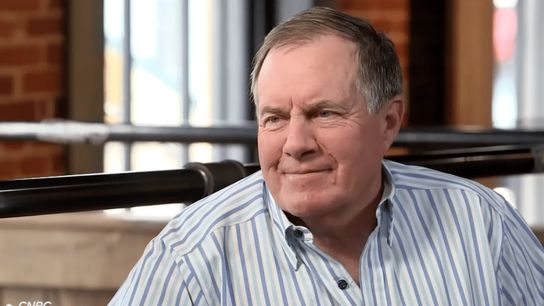Bill Belichick sat down for an interview with CNBC this week. Why, exactly, Belichick granted an interview to CNBC of all places is a mystery, but any time the most accomplished living coach speaks, his answers are worth listening to and remembering.
While he and the interview don't have the greatest chemistry -- Sample question: "Is your goal to win the Super Bowl?" -- Belichick is relaxed enough to give some insightful answers. The cut-off sweater and the scowl are stuffed in the closet in Foxboro, traded in for a dress shirt with the top button loose and his sleeves rolled up. The setting also helps: his favorite restaurant, a Navy-centric barbecue joint in Annapolis.
Here's a simple question to which Belichick gave a simple answer to a complicated concept: game-planning. Coaches plunge an unlimited number of hours into getting ready for a game, and the level of detail and variables that go into a football game are truly infinite. So with that in mind, how does Belichick know when enough is enough and it's time to go play?
"When everybody knows what to do," he said. "Because our game's so fast, everything happens so quickly. You review the situations, review the communication. You try to make sure that everybody's on the same page. If it's too complicated it's not going to work. If it's too simple that might not work either because it's too obvious. So you try to find that fine line in the middle where it's challenging enough for your opponents but it's something you can execute.
On a lesson he learned as a young coach: "Don't be afraid to use a good idea just because it's unconventional, just because somebody else hasn't done it. If you believe it's a good idea, then don't be afraid to use it."
On his core principles for building a team: "Do your job, be attentive, pay attention to details and put the team first. In football, to be successful as an individual you need your teammates, and the better you connect with them, the better you interact as a team, the better you'll do individually.
On hard lessons he's learned as a head coach: "You've got to count on your most dependable people. I'll put it this way: if we're going to lose, I'm going to lose with that guy or that person's mistake or coming up short in that area. And if it doesn't work it doesn't work, but we're going down with that person. It might not be your most talented person, but you count on your most dependable people. There have been times when I put too much responsibility on people that weren't dependable and they didn't come through. So who's fault's that? Mine. When you're the head coach, you can only do so many details. I would say at times I was too detail-oriented on some of the tasks that I was on and didn't give enough leadership in other areas."
